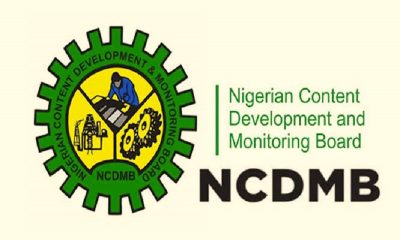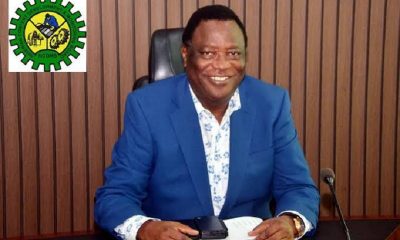General
NCDMB Trains Indigenous Companies on Quality Management Systems
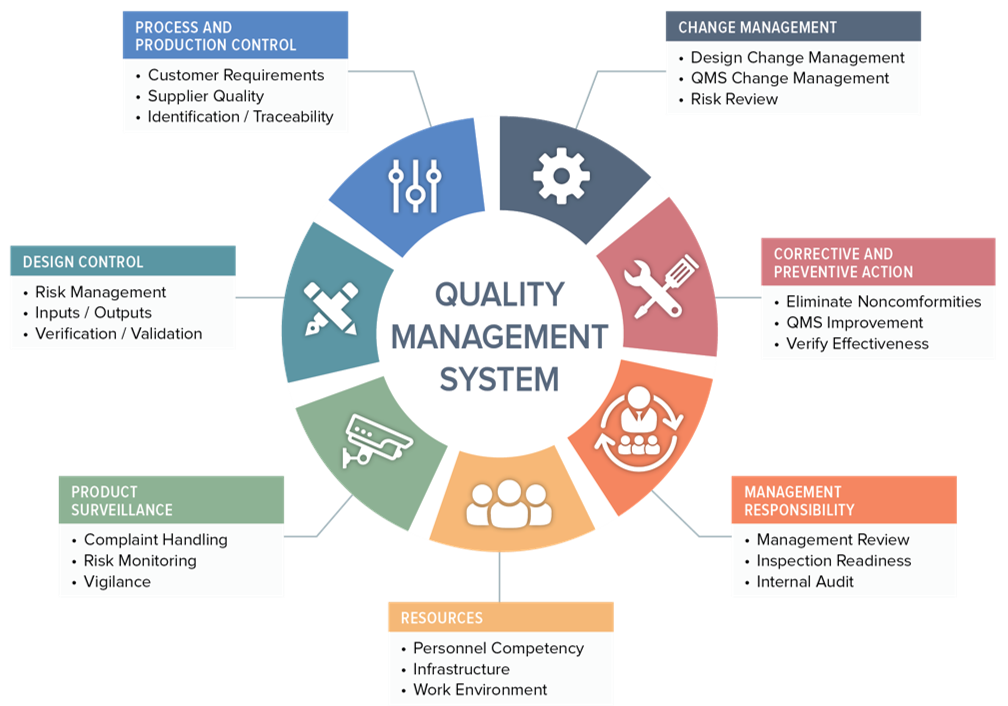
By Adedapo Adesanya
The Nigerian Content Development and Monitoring Board (NCDMB) has embarked on the training of indigenous companies on Quality Management Systems (QMS).
This is part of efforts by the board to build, improve and increase the capacity of Nigerians in the oil and gas sector.
The QMS training, which is ongoing in Port Harcourt, the capital of oil-rich Rivers State, is the first series of the second phase of the training.
QMS is a structured system that documents the processes, methods, and responsibilities for accomplishing quality policies and objectives.
In this context, it will assist the local organisations in coordinating and directing their activities to better fulfil the needs of their customers and regulatory authorities, as well as to continuously enhance their level of effectiveness and efficiency.
The most often used strategy for quality management systems is in accordance with ISO 9001:2015, which is an international standard that outlines requirements for quality management systems. The term “QMS” truly refers to the entirety of the system, despite the fact that some people use it to refer to the ISO 9001 standard or the collection of documents that detail the QMS. The document’s sole purpose is to provide a description of the system.
Speaking, NCDMB General Manager, Capacity Building Division, Dr Ama Ikuru, said the training is imperative to increase the participation of Nigerians in the oil and gas industry as well as accelerate the attainment of 70 per cent Nigerian content by 2027.
Dr Ikuru, represented by the Supervisor, Capacity Building Division, NCDMB, Mr Ikenna Umunnakwe, expressed delight with the trainees and conveyed Board’s expectations to them while urging them to take the training seriously.
“The training is also part of the Board’s effort to improve the capacity of personnel of Nigerian Oil and Gas companies in Quality Management Systems.
“The NCDMB values training because it aids in the achievement of one of our key mandates: Capacity Building in the Nigerian Oil and Gas Industry. Training is critical for increasing local capacity.
“This training is also intended to simplify our work at the Board because the awareness and knowledge gained by the staff of operators on the concept of QMS will allow the Board to work faster and better in achieving 70 per cent Nigerian Content by 2027.”
General
Salary Benchmarking To Ensure Competitive Compensation
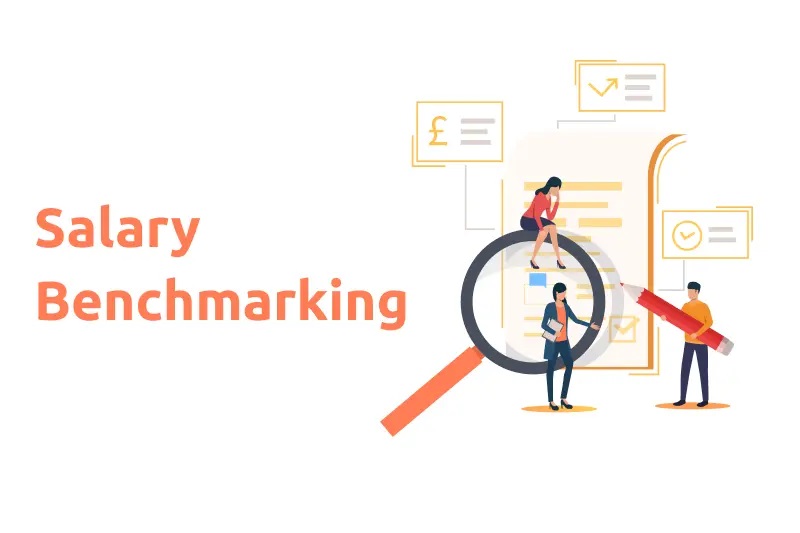
Salary benchmarking is the systematic process of comparing an organization’s pay rates, bonus programs, and total rewards against market standards. This article walks through why benchmarking matters, how to prepare and run an analysis, the best data sources and tools, and how to turn findings into defensible pay structures and ongoing processes.
Why Salary Benchmarking Matters For Online Businesses And Agencies
Without benchmarking, organizations risk three costly outcomes: underpaying (leading to high turnover and loss of institutional knowledge), overpaying (inflating fixed costs and reducing agility), or misallocating compensation across roles (creating internal inequities and morale problems).
For agencies that pitch retainer-driven services, predictable labor costs tied to market rates enable healthier margins and clearer pricing decisions. For in-house ecommerce teams, benchmarking supports workforce planning when launching new product lines or scaling paid acquisition efforts.
Finally, benchmarking is not only financial: it signals professionalism to candidates.
Key Data Sources And Tools For Accurate Benchmarks
High-quality benchmarking blends public data, commercial platforms, and human intelligence.
Public Government And Aggregated Salary Data
Bureau of Labor Statistics (BLS) or national equivalents provide reliable occupational wage ranges, useful for baseline comparisons and compliance checks.
Industry Surveys, Salary Platforms, And Niche Reports
Platforms such as Payscale, Glassdoor, LinkedIn Salary, and specialized reports for marketing and tech roles give role- and location-specific distributions.
Recruiter Intelligence And Peer Networks
Recruiters and hiring agencies provide real-time insight into candidate expectations and accepted offers. Professional networks, Slack communities, and agency owner peer groups can also offer current market anecdotes that databases miss.
Internal Payroll Data And Turnover Metrics
Historical payroll, hiring velocity, offer-acceptance rates, and exit interview themes help normalize market data against internal realities. Using multiple inputs helps find a defensible midpoint.
How To Conduct A Benchmark Analysis Step By Step
A repeatable process keeps benchmarking actionable and defensible.
- Gather data from at least three sources: one government/aggregate, one commercial salary platform, and one recruiter/peer input.
- Normalize data for location and experience. Convert salaries to equivalent cost-of-living or remote-adjusted values if the company has distributed teams.
- Adjust for total compensation. Include expected bonus, commissions, equity, and benefits to compare total rewards, not just base pay.
- Build a comparison table with target percentiles (25th, 50th, 75th) for each role and highlight gaps vs. current pay.
- Prioritize changes. Use a matrix that weighs business impact, retention risk, and budget feasibility to recommend immediate, near-term, and deferred adjustments.
This framework produces a clear narrative: where pay is behind, how much closing the gap will cost, and which adjustments will most protect revenue and client delivery.
Translating Benchmark Results Into Pay Structures And Budgets
Benchmark results must become predictable pay structures.
Normalize Data For Location, Experience, And Role Level
Apply consistent location multipliers and level definitions (junior, mid, senior, lead) so internal fairness stands up to scrutiny.
Build Pay Bands, Ranges, And Target Percentiles
Create bands with minimums, midpoints, and maximums tied to the chosen target percentiles. Bands help managers make consistent offer decisions and reduce bias.
Model Total Cost Of Hire And Budget Impact
Factor in employer taxes, benefits, onboarding costs, and ramp time. Present scenarios that show both absolute costs and return-on-investment when a higher-paid senior reduces client churn or improves campaign ROI.
Design Salary Bands, Bonus Structures, And Noncash Benefits
Consider sales- or performance-linked bonuses for account managers and revenue-attributed roles. Align Compensation To Performance, Retention, And Career Paths
Tie movements within bands to objective competency milestones (e.g., “strategic link acquisition that improves DR by X points” or “reduced time-to-rank for client cohort”), creating transparent merit progression that drives retention.
Communicating, Implementing, And Ensuring Pay Equity
Change management is as important as the numbers.
Gain Leadership Buy-In And Set Change Management Steps
Present benchmarking findings with clear ROI scenarios and phased implementation options. Leadership will respond to cost/benefit clarity, show how targeted raises stabilize revenue-generating roles.
Communicate Changes To Employees And Handle Pushback
Be transparent about methodology and timelines. Provide managers with scripts explaining why adjustments are happening and how employees can progress to higher bands.
Document Compliance, Pay Equity, And Recordkeeping Practices
Maintain audit-ready records of data sources, decision rationales, and salary matrices. Regularly run pay-equity checks by gender, race, and tenure to avoid legal and moral risks.
Thoughtful communication reduces rumors and ensures raises are seen as strategic investments, not arbitrary rewards.
Ongoing Monitoring: KPIs, Review Cadence, And Market Adjustments
Benchmarking isn’t a one-off. It requires monitoring and simple KPIs.
Track Competitive Positioning, Turnover, And Time To Fill
KPIs should include average comp vs. market percentile, voluntary turnover by role, offer-acceptance rate, and time-to-fill for critical positions. These metrics signal when the market has shifted.
Schedule Regular Reviews And Trigger-Based Market Rechecks
A typical cadence is an annual formal benchmark with quarterly spot checks for priority roles. Trigger-based rechecks, when turnover spikes, when offer-acceptance drops below a threshold, or when the market is disrupted, keep pay competitive between formal cycles.
With a small set of KPIs and a clear review cadence, agencies and online businesses can avoid reactive panic hires and keep compensation aligned with strategy and market reality.
Conclusion
Salary benchmarking equips online businesses and agencies to hire and retain the right talent without sacrificing profitability. When done well, benchmarking clarifies where to invest, makes offers defensible, and reduces turnover among roles that materially affect client outcomes and rankings.
General
BPP Confirms N1.1trn Savings from Procurement Reforms in 2025

By Adedapo Adesanya
The Bureau of Public Procurement(BPP) said the ongoing procurement reforms saved the federal government over N1.1 trillion between January and December 2025.
The Director-General of the bureau, Mr Adebowale Adedokun, revealed this while defending the agency’s 2026 budget before the Senate Committee on Public Procurement in Abuja on Thursday.
The bureau also reported reduced contract approval timelines, additional cost savings, and tougher sanctions imposed on erring contractors and non-compliant government officials.
Mr Adedokun appealed for increased budgetary allocation in 2026 to enhance service delivery, create jobs, and strengthen institutional capacity for procurement oversight.
He further revealed that the bureau received N4.032 billion in 2025 and sought higher funding to reinforce anti-corruption efforts under the administration of President Bola Tinubu.
Earlier, the Chairman of the Senate Committee, Mr Olajide Ipinsagba, a lawmaker from Ondo North, underscored the bureau’s strategic role in driving socioeconomic development and promoting fiscal discipline.
Mr Ipinsagba assured the agency of legislative support while urging strict accountability and prudent utilisation of public funds allocated for its operations.
BPP reforms were committed to deepening transparency, compliance, and efficiency in Nigeria’s public procurement system. Some of them include adherence to a 21-day timeline, as mandated by the Public Procurement Act 2007. Also, the BPP is required to review cases, issue a written decision within 21 working days of receiving the complaints, and state the corrective actions, reasons for rejection, or remedies granted.
There are also plans to streamline approval processes, standardise documentation, and automate workflows to ensure timely and transparent procurement decisions.
General
FCT Council Elections: Police Impose 12-Hour Curfew
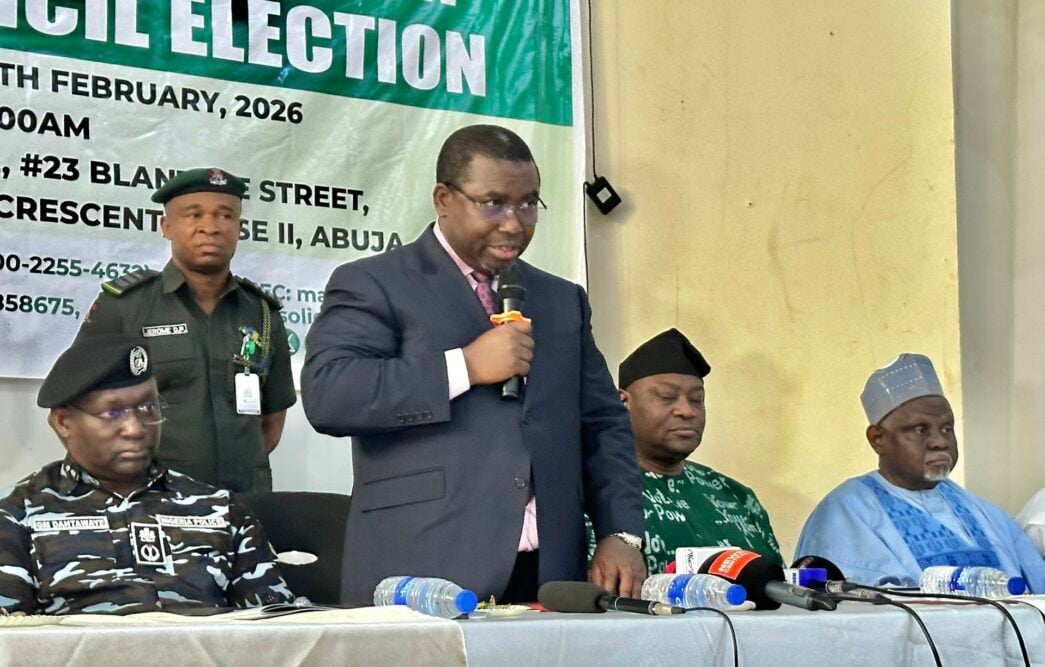
By Adedapo Adesanya
The Federal Capital Territory (FCT) Command of the Nigeria Police Force (NPF) has announced a 12-hour restriction on movement across Abuja and its environs ahead of the council elections scheduled for Saturday, February 21, 2026.
In a statement, the Police Public Relations Officer of the FCT Command, Mrs Josephine Adeh, said the movement will be restricted to ensure security and the smooth conduct of the polls.
“The Commissioner of Police, FCT Command, Miller G. Dantawaye, psc., has announced a restriction of movement across the Federal Capital Territory from 6:00 AM to 6:00 PM on Saturday, 21st February, 2026, in view of the scheduled Area Council Elections,” the statement read.
The police clarified that the restriction will apply to all residents, except essential service providers and duly accredited election officials.
The command also called on residents to remain peaceful and cooperate with security agencies.
“The FCT Police Command urges residents to remain peaceful, law-abiding, and cooperate with security agencies to ensure a safe, free, and credible electoral process,” the statement added.
Meanwhile, the FCT Minister, Mr Nyesom Wike, declared Friday a work-free day ahead of the council elections.
In a broadcast, Mr Wike said the decision, approved by President Bola Tinubu, is to enable residents to travel to their communities to vote.
In contrast to the police announcement, the minister declared a separate restriction of movement across the FCT from 8:00 p.m. on Friday to 6:00 p.m. on Saturday, directing security agencies to ensure compliance.
Mr Wike urged residents to turn out in large numbers and conduct themselves peacefully, expressing optimism that the polls would produce leaders who would promote development and stability in the territory.
In the meantime, the Independent National Electoral Commission (INEC) says preparations for the elections are at an advanced stage, with strong voter participation recorded during the PVC collection exercise.
INEC disclosed that 1,587,025 Permanent Voter Cards (PVCs) have been collected across the FCT, representing a 94.4 per cent collection rate out of the 1,680,315 registered voters.
Security agencies have assured residents of adequate deployment across the territory to maintain order, as authorities emphasise the need for a peaceful, free, and credible electoral process.
-

 Feature/OPED6 years ago
Feature/OPED6 years agoDavos was Different this year
-
Travel/Tourism10 years ago
Lagos Seals Western Lodge Hotel In Ikorodu
-

 Showbiz3 years ago
Showbiz3 years agoEstranged Lover Releases Videos of Empress Njamah Bathing
-

 Banking8 years ago
Banking8 years agoSort Codes of GTBank Branches in Nigeria
-

 Economy3 years ago
Economy3 years agoSubsidy Removal: CNG at N130 Per Litre Cheaper Than Petrol—IPMAN
-

 Banking3 years ago
Banking3 years agoSort Codes of UBA Branches in Nigeria
-

 Banking3 years ago
Banking3 years agoFirst Bank Announces Planned Downtime
-

 Sports3 years ago
Sports3 years agoHighest Paid Nigerian Footballer – How Much Do Nigerian Footballers Earn



